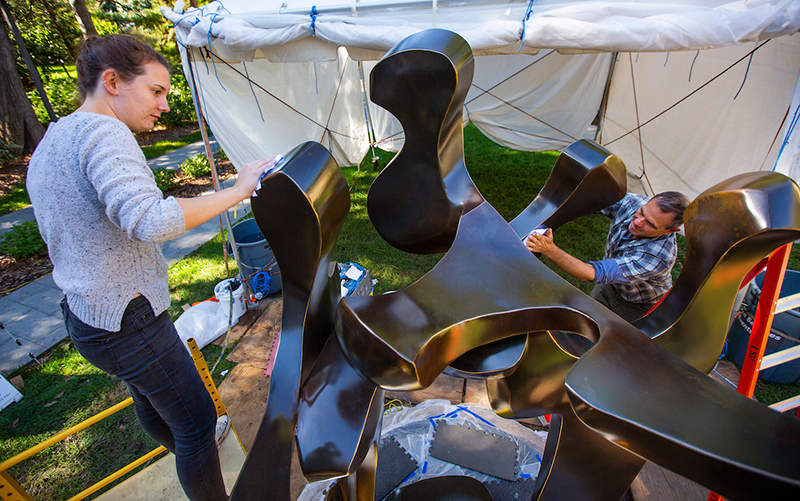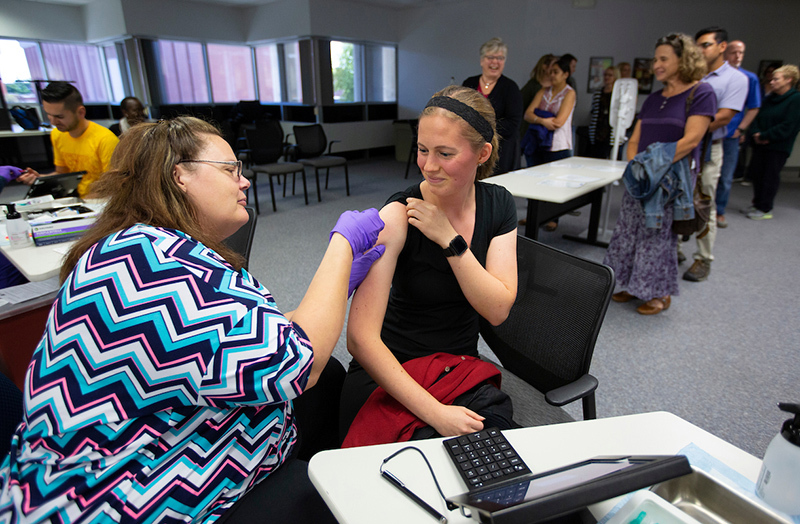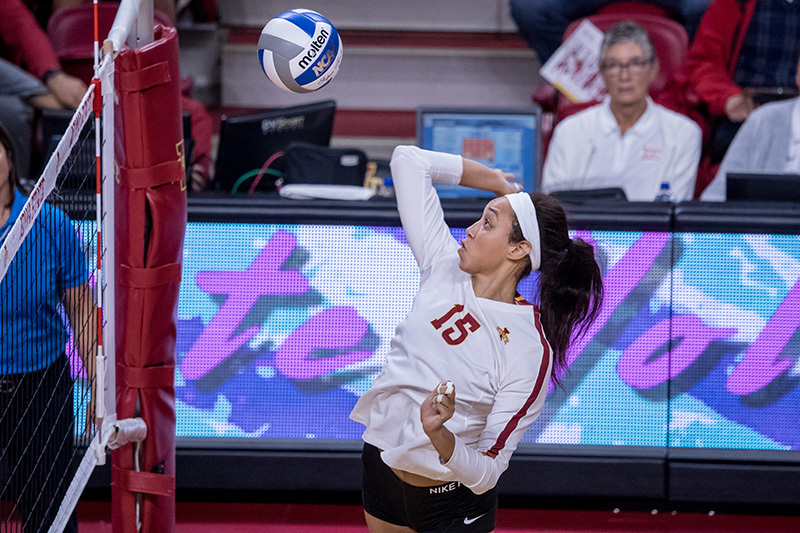Conservation weather

Photo by Christopher Gannon.
From left, assistant curator Sydney Marshall, university museums, assists art conservator Francis Miller with preservation work this week on the 9-foot Bravo III bronze sculpture west of the Gerdin Business Building. Miller, who owns the Hamden, Connecticut-based Conserve ART, has worked on numerous projects for university museums in the last decade, including Christian Petersen's bronze panthers east of Morrill Hall (2012) and the four limestone muses outside the top floor of Marston Hall (2015).
After removing oxidized buildup on the sculpture's surface, Miller and Marshall applied a protective acrylic coating to the bronze (pictured). The final, warm weather-dependent step in the process will be a wax coat for further protection from the elements.
Bravo III, by Bill Barrett, is part of university museums' Art on Campus collection.
Campus climate results are driving new initiatives
President Wendy Wintersteen wants Iowa State to be the nation's most welcoming and inclusive land-grant institution -- a goal she emphasized again in her Sept. 11 State of the University address. It's something she's asking senior leaders to help keep front and center.
"This is a goal that I talk about with different groups every week," she said last month. "This is an important priority and one that we have to stay focused on."
Starting point
A campus climate survey conducted in fall 2017 provided a baseline of personal perceptions and experiences related to living, working and learning at Iowa State. When the results were shared in spring 2018, Wintersteen appointed four work groups to further study the data and develop action items. The teams and their chairs are:
- Undergraduate students (Martino Harmon, senior vice president for student affairs)
- Graduate and post-doc students (Bill Graves, Graduate College dean)
- Faculty (Jonathan Wickert, senior vice president and provost)
- Merit and professional and scientific staff (Reg Stewart, vice president for diversity and inclusion)
The teams submitted their reports to the president last spring, with recommendations for new initiatives and enhancements to current programs. In a recent memo to senior leaders, Wintersteen identified five priorities with broad campus impact that will move forward with the continued help of the work group chairs to oversee implementation. They are:
- Providing consistent information and training on diversity, inclusion and equity for new student onboarding
- Developing a civility campaign rooted in ISU's Principles of Community
- Creating a task force to improve access to high-quality, affordable child care
- Improving professional and leadership development opportunities
- Providing graduate students with additional information, support and services
Ideas in motion
Work is underway. Diana Sloan, program director for Hispanic and Latino affairs in the diversity and inclusion office, already is laying the groundwork for the civility campaign. The child care task force, co-chaired by interim vice president for university human resources Kristi Darr, associate provost for faculty Dawn Bratsch-Prince and Graduate College associate dean Carolyn Cutrona, will convene its first meeting this month.
But campus efforts aren't limited to the broad-based priorities outlined by the president. New programs and enhancements to existing initiatives address other issues identified in the campus climate survey results. Examples include a partnership with the city of Ames that created collaborative groups and a symposium on building inclusive organizations, a new faculty fellow post for diversity and inclusion, and central lab space that provides assistive technology resources to students with disabilities.
"It's important that we keep moving forward to address concerns we learned from the campus climate survey, and what we continue to learn from ongoing conversations," Stewart said. "President Wintersteen recognizes that diversity, equity, and inclusion are core components of the continuous improvement cycle. We have to take two steps forward every day and do our best to avoid backward steps along the way.”
Related story
Exercising your political expression rights while respecting ISU policy
The lead-up to the Iowa Caucus every four years makes campaigns especially prevalent and raises questions about what political activity is appropriate for Iowa State faculty and staff.
Senior vice president and provost Jonathan Wickert shared some guidance on employee political activity in a memo last month to the provost's council and the leaders of the Faculty Senate, Professional and Scientific Council, and the department chairs cabinet.
Wickert noted that Iowa State employees have the same rights to participate in politics as any person, including supporting and opposing candidates or legislation. But those rights apply when you're speaking for yourself on your own time, using your own phone, computer and internet service.
Faculty and administrative leaders in particular should be careful to avoid suggesting that their personal views are those of the university as an institution. A good rule of thumb, Wickert said, is to clarify you are speaking as an individual if there could be any ambiguity.
The same policy applies when making public comments about state legislative matters. All political advocacy on behalf of Iowa State must be approved by the president's office and, subsequently, the state Board of Regents' government relations officers, Wickert said.
Below are some guidelines in question and answer form based on Wickert's memo and tips prepared by the university counsel's office:
As ISU faculty and staff, can we speak up about our personal political views?
You have the same rights to engage in political expression and action as anyone else in the U.S., but you shouldn't say or imply that your views or activity represent the university. Direct any questions about what is allowed to university counsel Michael Norton, 294-5352 or mnorton@iastate.edu.
Can I discuss politics in the office?
Yes, if you're not disrupting work.
Can students display political banners and signs in residence hall rooms?
Yes.
If I express a political view in a letter to the editor, is it OK to use my university title?
For purposes of identification, you can use your university title, as long as you don't imply that you speak on behalf of the university. If there's any chance of confusion, you should clarify that you're speaking only for yourself.
May I engage in activities supporting candidates or ballot measures?
Yes, if it's on your own time and with your own equipment. State law prohibits employees from working on a political campaign during work hours. University computers and email accounts are for business purposes. While university policy allows some incidental personal email use, that wouldn't apply to sending email blasts to support a candidate or ballot measure.
May I invite a candidate or political advocate to speak to my class?
Federal law requires that all candidates have equal and fair access to the university. If you invite a candidate or advocate to your class, you must give opposing candidates and speakers the same opportunity. It's OK if they don't accept the offer. The same need to allow for political balance applies to discussion of candidates, voter registration drives or other activities that could be perceived as partisan. Make sure discussion of politics during class is relevant to the course curriculum.
Are candidate forums allowed?
Yes, if the forums or series of events are balanced and intended to educate the community on issues relevant to an upcoming election.
What about an ISU faculty or staff member presenting research on the political process or a ballot measure?
That's allowed, assuming it's not a pretext for supporting a candidate or ballot measure.
May university officials comment on how candidate actions or ballot measures might affect Iowa State?
Yes, as long as the comments reflect concern about the university and its mission. The comments cannot be simply an attempt to influence the success or failure of candidates or measures.
Can university buildings be used for political campaign activities?
Generally, campaign events should be held in spaces available for public use, such as the Memorial Union (294-1437) or the Iowa State Center (294-3347). To assure fairness and to give priority for academic uses, the university discourages use of academic buildings and spaces for campaign events. Faculty and staff who receive requests for space for a campaign event should contact federal relations director Sophia Magill, smagill@iastate.edu or 294-2320.
If current public officials request facility tours, is it OK to comply?
As long as the purpose of the tour is to provide information for the public official and does not involve a solicitation for votes, it will not be treated as a campaign event. Generally, such events should be coordinated through Magill or state relations officer Carolann Jensen, cjensen3@iastate.edu or 515-250-2585.
Search begins for next vice president for research
Iowa State has launched the search for its next vice president for research (VPR).
The successful candidate will succeed Sarah Nusser, who recently announced that she would complete her service as VPR at the end of the fiscal year.
"Iowa State is one of America's leading research universities, so we expect the position will be very attractive to candidates both on campus and around the world," said senior vice president and provost Jonathan Wickert. "We expect to recruit a leader who will continue to grow the university's research programs and sustain the momentum created by Sarah and her team during the last five years."
Dan Grooms, the Dr. Stephen G. Juelsgaard Dean of Veterinary Medicine, and Shauna Hallmark, professor of civil, construction and environmental engineering and director of the Institute for Transportation, will co-chair the search committee. They are joined by:
- James Andrews, University Professor, history; and director emeritus, Center for Excellence in the Arts and Humanities
- Curtis Brundy, director, collections and technical services, University Library
- Alicia Carriquiry, Distinguished Professor, statistics; and director, Center for Statistics and Applications in Forensic Evidence
- Patricia Daugherty, professor, supply chain management
- Panteleimon Ekkekakis, professor, kinesiology
- Caroline Hayes, chair, mechanical engineering
- Chad Higgins, senior director, ISU Extension and Outreach
- Kristine Johansen, program manager, economic development and industry relations
- Sarah Kaatz, director, office for responsible research
- Jennifer Margrett, interim associate dean, College of Human Sciences
- Jamie Morris, chief research officer, U.S. Department of Energy Ames Laboratory
- John Odenweller, program coordinator, agricultural and biosystems engineering
- Paul Plummer, associate professor, veterinary diagnostic and production animal medicine; and director, National Institute of Antimicrobial Resistance Research and Education
- Max Rothschild, Distinguished Professor, animal science
- Julie Stevens, associate professor, landscape architecture
- Martin Thuo, assistant professor, materials science and engineering
The committee will define a search timeline when it meets for the first time. The process will begin with the nomination of candidates and a review of applications, followed by interviews with semifinalists and then finalists. The university will hire a search firm to assist the committee throughout the process.
Flu shot clinic wraps up Oct. 18

Photo by Christopher Gannon.
Emily Johnson (center), a record analyst in the admissions office, is among those who have made time this week to get a flu shot in the Technical and Administrative Services Facility (TASF) on the north side of campus.
ISU WellBeing, assisted by occupational medicine, is sponsoring a flu shot clinic for university employees through Friday, Oct. 18. The clinic is open weekdays from 9 a.m. to 4 p.m. in 205 TASF.
Employees need their nine-digit university ID number to check in. The vaccine is provided at no cost for these employee groups:
- Faculty, professional and scientific, and merit
- Postdocs
- ISU Foundation
- Iowa State Daily benefits-eligible staff
- Retirees on the ISU health plan who are not yet 65 years old
Related story
- Employee flu shot clinic is set for Oct. 7-18, Sept. 26, 2019
P&S Council learns more about new law regarding stun guns
Last May, Gov. Kim Reynolds signed a law that prohibits Iowa's public universities and community colleges from banning stun guns on campus. But what is and is not legal when it comes to possessing stun guns at Iowa State?
"The dangerous weapons statute was not touched by the Legislature, so a stun gun is still a dangerous weapon," said ISU Police chief Michael Newton during a presentation at the Professional and Scientific Council's Oct. 3 meeting.
Anyone at least 18 years old can carry a stun gun on campus as long as they do not use it to commit a crime. Language was added last November that eliminated the need to have a permit to carry a stun gun.
Stun guns
There are two types of stun guns. Only a nonprojectile model is allowed on campus. It delivers an electric shock, but Newton said most use a 9-volt battery, which limits their effectiveness.
"You do have to make physical contact with someone to use it. It is not like TV -- when you touch someone, they don't just drop and go unconscious," Newton said. "It is a pain compliance tool, and it makes [an attacker] angry because it hurts."
Newton said because physical contact is needed there is a chance it can be taken away from someone trying to use it.
Projectile stun guns will knock down someone who is hit with the darts the gun fires. That type of stun gun still is illegal on campus, except for police.
"It shoots darts and uses neuromuscular incapacitation that locks all of your muscles up and you go down," Newton said.
Possess vs. carry
Newton said his department is working with Student Government to educate students about stun guns, and officers had conversations with several parents during fall orientation. Students 18 years old or older, can own a stun gun and have it in their residence hall as well as carry it around campus.
The legal impact of using a stun gun -- even in a residence hall -- would depend on the reason for the use, Newton said.The new law does not allow stun guns inside athletic facilities and hospitals at State Board of Regents universities.
Alternatives
Newton said safety alternatives to a stun gun include free self-defense classes, the Guardian mobile app and pepper spray.
"There are no restrictions on pepper spray on campus, but I always caution people that anything you carry can be used against you," Newton said. "We haven't seen issues with pepper spray ... and in the few months this [law] has been passed we have not seen any issues with stun guns."
Other business
Tom Elston, director of office operations for the ISU Alumni Association, was unanimously approved to serve on the council until June 2020. Elston is filling a vacancy created in the president's office. He also will serve on the council's awards committee.
Cyclone volleyball home stand

Photo courtesy of athletics communications.
Avery Rhodes, a redshirt sophomore from Waco, Texas, tallied nine kills and two blocks in Iowa State's three-set loss against No. 1 Baylor Wednesday night in Hilton Coliseum. Rhodes, the team's leading blocker this season, earned Sept. 2 Big 12 Conference defensive player of the week honors with a 10-block performance against Mississippi. The Cyclones are in the midst of a three-match home stretch, hosting Texas Tech Saturday, Oct. 12, and TCU Wednesday, Oct. 16. Tickets are $5, available online and at the door.
A list of fundraiser events for United Way
As a campus community, Iowa State has a goal of raising $410,500 in cash and pledges by Dec. 1 for the United Way of Story County. Associate provost for faculty Dawn Bratsch-Prince is the chair of the campus campaign, with vice president for extension and outreach John Lawrence serving as chair for leadership gifts. They're assisted by employee volunteers across the university.
One way units can hit their mark is through fundraising initiatives opened to the wider campus community. Below is a list Inside staff have compiled of current events open to all. Send us your United Way fundraising event and we'll add it to the list.
- College of Agriculture and Life Sciences online auction, closes at 4 p.m. Oct. 10
- College of Design marshmallow golf and printer destruction, 11:30 a.m.-1 p.m. Oct. 16, east lawn of College of Design buidling
- College of Liberal Arts and Sciences online auction, closes at 5 p.m. Oct. 11
- University Library online auction, planned for October (TBA, contact Susan Jasper or Jeff Kushkowski to donate an item)
